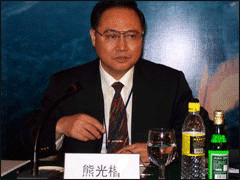
China’s Central Military Commission
Xiong Guangkai Ain’t On It …
A little low hanging fruit this morning.
Bill Gertz and Rowan Scarborough report:
Pentagon officials said Chinese Deputy Chief of Staff Gen. Xiong Guangkai is retiring. Gen. Xiong … is considered one of the most influential Chinese military officials …
Gen. Xiong was passed over for the post of Chinese defense minister in the leadership shuffle that brought President Hu Jintao to power.
Gertz has zero idea what he is talking about. Xiong didn’t even make the Central Committee—let alone the Central Military Commission. One Hong Kong newspaper called the rebuff a case of “burning down the stove due to overheating.” Elected as an alternate to the Central Committee, Xiong ranked 148 out of 158 alternates
As for being passed over for Defense Minister, David Shambaugh notes that it was Xiong who “audaciously bragged to a number of visiting foreign delegations that he would be promoted high up the hierarchy—possibly to become the Minister of Defense.”
He was passed over for Defense, like I was passed over for SecState.
The only reason that Gertz et al have been promoting Xiong is because he was widely—and incorrectly—quoted as threatening Los Angeles with a nuclear strike. If Xiong is a big deal, so is the threat.
But Xiong didn’t say it. Chas Freeman, to whom Xiong reportedly made the remark, explains:
This statement came out in garbled form in The New York Times. It was made toward the end of a five-hour argument in October 1995, over what the probable effect would be of the military maneuvers the Central Military Commission had authorized in the Taiwan Strait. It was my position, which turned out to be correct, that if China carried through with its plans, it would get a good American military reaction. It was the position of the Chinese military officers, with whom I was speaking, that there would be no American military reaction.
At the end of the very heated argument, one of them said, “And finally, you do not have the strategic leverage that you had in the 1950’s when you threatened nuclear strikes on us. You were able to do that because we could not hit back. But if you hit us now, we can hit back. So you will not make those threats. In the end you care more about Los Angeles than you do about Taipei.” Please note the statement is in a deterrent context and it is consistent with no first use. It is not a threat to bomb Los Angeles.
Bottom line: Xiong didn’t threaten to bomb Los Angeles. The only people who care what Xiong has to say are the right-wing nuts who fixate on a misquoted (and possible misattributed) comment to distort Chinese nuclear planning.
Late Update: I should add that Freeman has never said that Xiong was the official in question. Bart Gellman in The Washington Post reported (June 21, 1998) that “government analysts soon concluded that Freeman’s interlocutor had been Lt. Gen. Xiong Guangkai…”


I would also add the observation that the Ministry of Defense in China is actually a fairly weak institution, and is nothing like DoD. Most Chinese military planning occurs at the Party or State CMC level, and the Ministry of Defense is largely involved with ceremonial military exchanges and delegations to other countries. Gertz has no idea what he’s talking about in more ways than one.
Gertz doesn’t care. This discussion is exactly what he likes, getting arms controllers, diplomats, liberals and whatnot fired up as much as the red meat crowd. Accuracy is very much a tertiary consideration, if that. You might note that earlier this week, he reported as unattributed fact that the Robust Nuclear Earth Penetrator is designed to burrow 300 feet into rocky soil. No one but delusive members of Congress believes that and for good reason: No material or law of physics has been found to permit it. Hey, but that’s Gertzworld; don’t let the facts or the world as we know it get in the way of a screed.